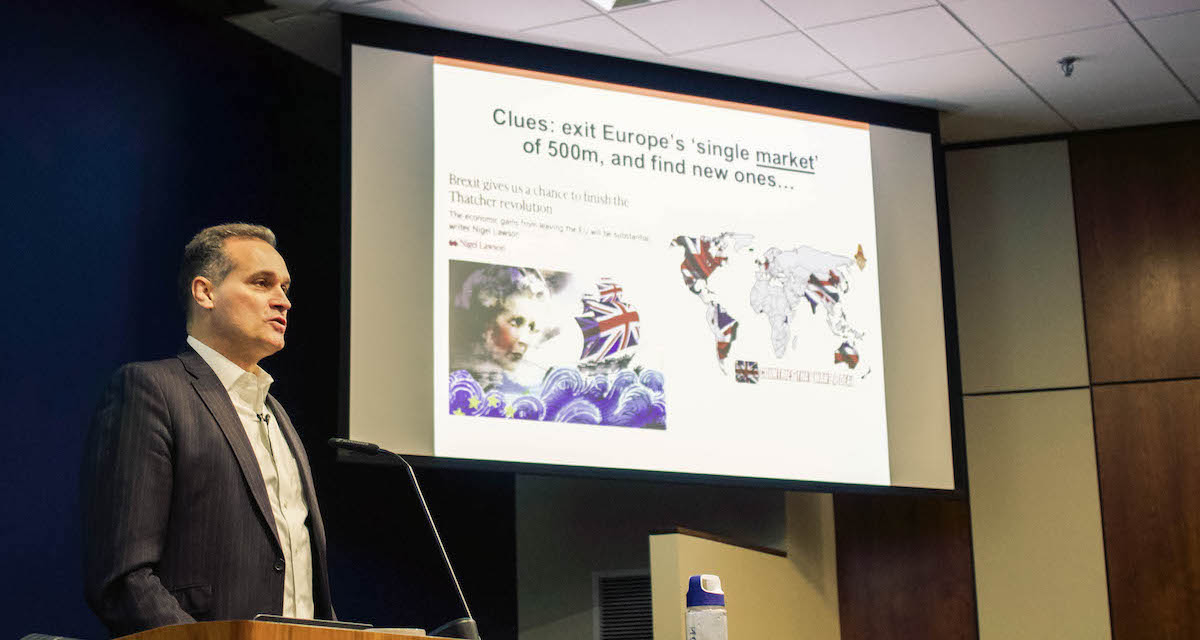Five Brexit Insights from a Former British Diplomat
For the United Kingdom, the Halloween season held more anticipation and suspense than haunted houses and spooky costumes. It was to be a fateful day determining the country’s future—Brexit.
Over three years since Britain voted through referendum to exit the European Union (thus the nifty term “Brexit), the time has come to decide how. In advance of the momentous occasion when Britain would reach and ratify an exit agreement with the EU, former British consul general for New England Phil Budden visited campus to weigh in with a lecture, “Brexit, Britain, and Hallowe’en—Deal or No Deal?” But just minutes before his address, Budden was scouring the BBC and updating his slideshow after receiving breaking news: the vote had been delayed (again).
“Jolly good!” said Budden, suddenly tasked with even more responsibility to explain the latest developments. The former diplomat previously served as the first secretary at the British Embassy in Washington, D.C., and as an advisor to the prime minister on European and institutional strategy. Now a senior lecturer at MIT’s Management School in Technological Innovation, Entrepreneurship, and Strategic Management, Budden openly admitted his stance against Brexit and cautioned it would be his angle for the lecture.
In search of insights on Brexit and tips for engaging in politics, The Bell compiled a list of the top five takeaways from Budden’s address.
1. What’s the big deal?
After the people of Britain voted in 2016 to exit the EU, the UK is addressing some tough questions, with answers that matter—will it be a “hard Brexit” with a clean break from EU institutions, or a slower transitioned “soft Brexit”? How can Brexit be structured to avoid the return of political violence in Northern Ireland? Will Scotland leave the UK and join the EU as an independent country?
2. Why Halloween?
Despite Brits’ “Brexit” jack-o-lanterns and Boris Johnson masks, the decision to set the exit agreement deadline on October 31 wasn’t for the sake of ironic decorations—it was to align with the start of new terms of EU officials. Today, new EU presidents of the European Central Bank, commission, council and council representative for foreign affairs enter office.
3. “Yes” or “no” on a ballot is rarely that simple.
What are the implications of those options? In Britain’s case, the 2016 ballot simply asked citizens if they wanted to leave the Now after the majority “yes” vote, Budden highlighted the negative consequences that Britain now considers—what leaving the EU means for issues including trade, national security, foreign relations and even domestic tension.
Student take: Noah Heidorn ’22 (political science)
“My curiosity in the conversation was piqued from the very beginning when Dr. Budden mentioned how simply the original referendum questions were posed: ‘Would you like to remain in the European Union, or would you like to leave the European Union?’ In his position as a diplomat, I thought it was interesting he noted the simplicity of how it was first framed to the public.
4. Voting makes a difference.
Now that Britain is more informed about Brexit, would they still cast the same vote? Results of the 2016 were close—52 percent “yes,” 48 percent “no,” but Budden asserts that re-voting even just one week later would have produced vastly different results. Had more youth been informed and compelled to vote beforehand, Budden believes they would have boosted the “no” numbers.
Student take: Matt Blouin ’23 (international affairs)
“A key point brought up [in the lecture] was about how the younger population, mostly the people too young to vote, had no say. Given that the right to vote and voting eligibility ultimately takes place at eighteen, when you are legally considered an adult, the younger population will be growing up in a post-Brexit world . . . the younger generations will be ‘guinea pigs’ in a ‘new society.’”
5. Step back from bias.
It’s what a good diplomat does, says Budden, who ironically holds a firm position on the matter. “We tried to understand why things are happening the way they are. And then we try to understand what the future is going to hold.”
 The Bell
The Bell